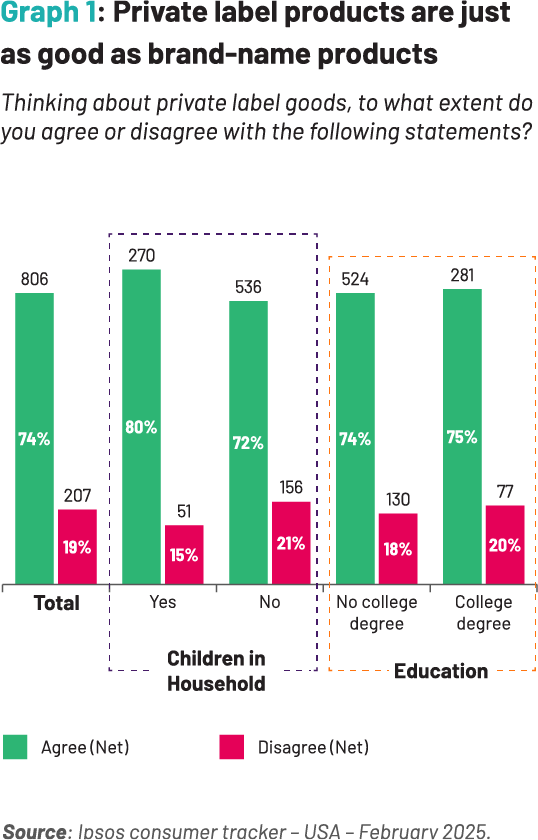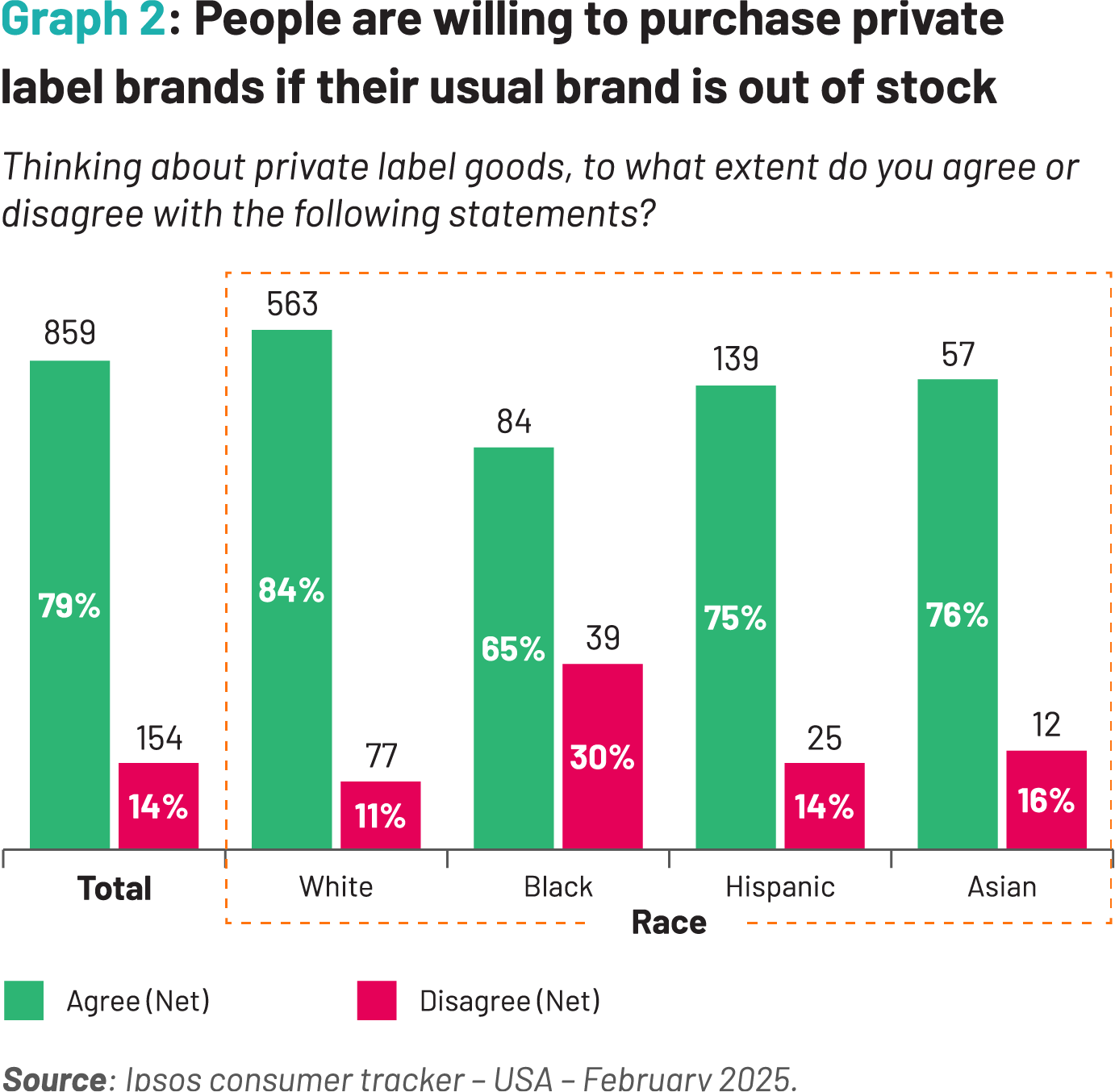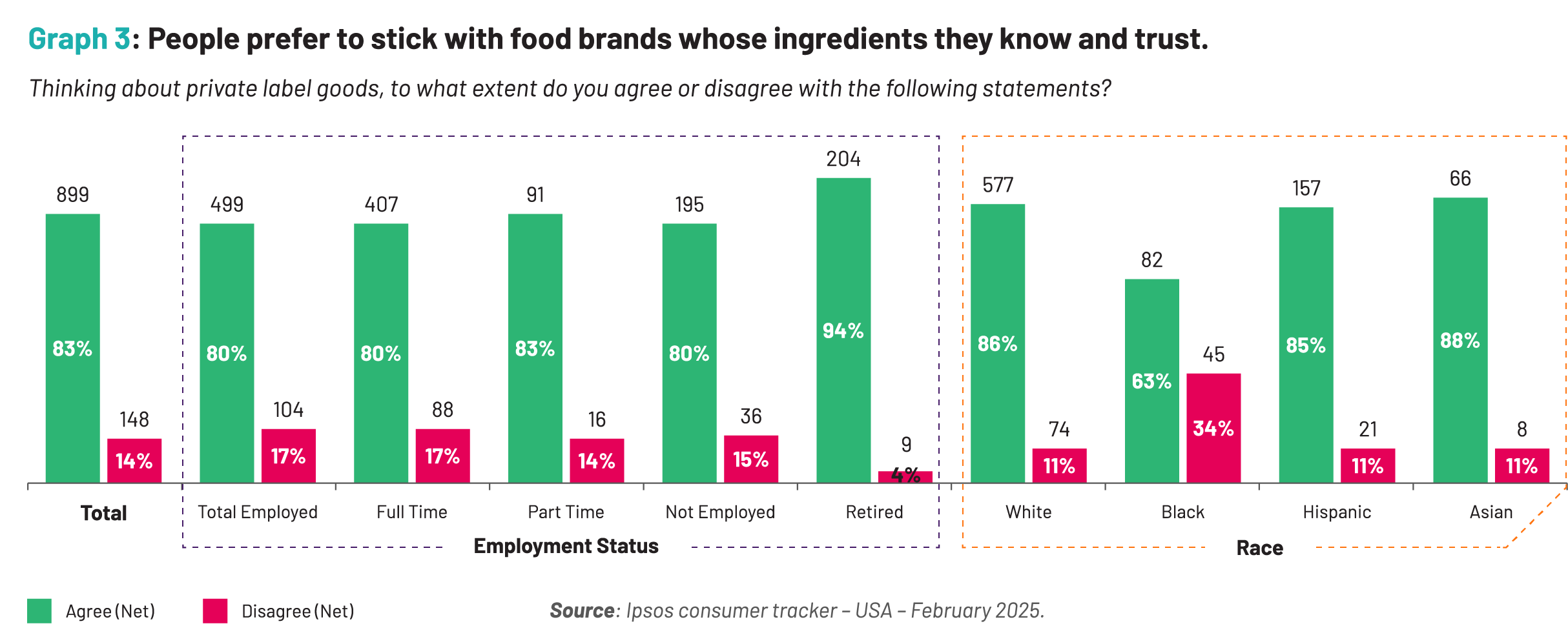

The Rising Tide of Private Labels: How name brands can stay afloat
TL;DR
- Private label products are closing the quality gap with name brands. Consumers increasingly view private labels as comparable in quality, leading to a willingness to choose them over name brands, especially among younger demographics and higher-income shoppers.
- Brand loyalty remains a significant factor for many consumers. Despite the rise of private labels, a large portion of shoppers, particularly older generations, remain loyal to their preferred name brands, especially in categories like food.
- Name brands should prioritize innovation and differentiation. To compete, they must offer unique products and features that private labels can't easily replicate, staying ahead of evolving consumer trends.
- Building strong brand equity is crucial for name brands. This involves crafting compelling brand stories, highlighting heritage and values, and connecting with consumers on an emotional level to foster loyalty beyond price.
- Enhancing customer experience is key for name brand differentiation. This includes personalized services, loyalty programs, exceptional support, and a seamless omnichannel experience that exceeds expectations.
Introduction
The retail landscape is undergoing a seismic shift. Private label brands, once relegated to the dusty bottom shelves, are experiencing a surge in popularity, challenging the dominance of established name brands. This paper delves into the factors driving this trend, analyzes the threat posed by private labels, and outlines strategies for name brands to defend their market share and thrive in this evolving retail environment.
From Stigma to Success: The Rise of Private Labels
The success story of private labels can be attributed to a confluence of factors. Firstly, the quality gap that once existed between name brands and private labels has narrowed considerably. Retailers, recognizing the potential of private labels, have invested heavily in improving product quality and packaging, effectively shedding the image of inferiority that plagued them in the past. Our survey found that a strong majority of respondents (74%) agree that private label products are just as good as brand-name products, a sentiment echoed across income and geographic demographics. This positive perception extends across education levels, with over 74% of respondents with or without a college degree agreeing on the comparable quality (Table 1).

Secondly, the economic uncertainty of recent years has made consumers more price-sensitive, driving them towards the value proposition offered by private labels. This shift in consumer behavior has been further fueled by the strategic marketing efforts of retailers who are actively promoting their own brands, often positioning them as premium alternatives. This resonates with our findings that 79% of respondents are willing to purchase private label brands, especially if their usual brand is unavailable. This willingness is particularly high among younger demographics (18-54) and those working outside of their homes, suggesting a growing acceptance of private labels among these consumer segments. Interestingly, White and Asian respondents show a higher inclination towards choosing private labels over Black and Hispanic respondents (Table 2), indicating potential cultural influences on brand preferences.

Eroding Brand Loyalty: The Price-Value Challenge
The rise of private labels poses a significant threat to name brands, primarily by eroding traditional brand loyalty. Consumers, armed with information and empowered by choice, are increasingly willing to switch to private label alternatives, especially in categories where they perceive little difference in quality. This shift is particularly evident in categories like pantry staples, household goods, and even certain personal care products. The price-value equation plays a crucial role in this dynamic. Private labels, by leveraging their direct relationship with retailers and minimizing marketing and distribution costs, can often offer lower prices without compromising on quality, making them an attractive proposition for budget-conscious consumers. Indeed, our research shows that younger, higher-income shoppers are particularly open to choosing store brands, especially when their preferred name brand is unavailable.
However, despite the growing popularity of private labels, a significant portion of consumers still exhibit strong brand loyalty. Our survey revealed that a strong majority (74%) of respondents have favorite brands of products they buy often and are unwilling to switch.
This loyalty is particularly evident in the food sector, with 83% of respondents preferring to stick with brands whose ingredients they know and trust. This preference is particularly strong among retirees and employed individuals (Table 3), suggesting a correlation between brand loyalty and lifestyle factors.

Innovation and Differentiation: The Name Brand Advantage
Despite the challenges posed by private labels, name brands possess inherent strengths that can be leveraged to maintain their competitive edge. The most potent weapon in their arsenal is innovation. By constantly innovating and introducing new products, features, and flavors, name brands can stay ahead of the curve and offer something unique that private labels cannot easily replicate. This requires a commitment to research and development, a deep understanding of evolving consumer trends, and the agility to adapt quickly to changing market dynamics.
Building Brand Equity: Beyond the Product
While innovation is crucial, it is equally important for name brands to focus on building strong brand equity. This goes beyond simply offering a superior product; it involves crafting a compelling brand story, highlighting heritage and values, and engaging in emotional marketing that resonates with consumers on a deeper level. By creating a strong emotional connection with consumers, name brands can foster loyalty that transcends price considerations. This can be achieved through compelling storytelling, impactful advertising campaigns, and authentic engagement with consumers across various touchpoints. This is further supported by our findings that a significant majority (69%) of respondents believe in the proven track record of name-brand products, highlighting the importance of brand reputation and consumer trust.
Enhancing the Customer Experience: A Key Differentiator
In an increasingly competitive market, providing an exceptional customer experience can be a key differentiator for name brands. This encompasses various aspects, including personalized services, loyalty programs, exceptional customer support, and a seamless omnichannel shopping experience. By exceeding customer expectations at every touchpoint, name brands can cultivate stronger relationships and encourage repeat purchases. This customer-centric approach can be further enhanced by leveraging data and analytics to understand individual customer preferences and tailor the shopping experience accordingly.
Strategic Partnerships and Omnichannel Strategies: Navigating the New Retail Landscape
To effectively compete in this evolving landscape, name brands need to embrace strategic partnerships and omnichannel strategies. Collaborating with retailers on exclusive products or promotions can be mutually beneficial, allowing name brands to leverage the retailer's reach and customer base while offering retailers a unique selling proposition. Additionally, creating a seamless online and offline experience for consumers is paramount. This involves optimizing their presence on e-commerce platforms, ensuring consistent branding and messaging across all channels, and leveraging technology to personalize the shopping experience.
In conclusion, the rise of private labels presents both a challenge and an opportunity for name brands. By embracing innovation, building strong brand equity, enhancing the customer experience, and adopting strategic partnerships and omnichannel strategies, name brands can not only defend their market share but also thrive in the face of competition. The key lies in understanding the evolving consumer landscape, adapting to changing market dynamics, and leveraging their inherent strengths to deliver exceptional value and a compelling brand experience.
Source: Ipsos consumer tracker – Wave 111 – February 2025
Are you interested in a customized strategy session tailored specifically to your brand's needs? Contact Emmanuel Probst to learn more about our live learning workshop and roundtable. Here's what you can expect:
- Key findings from our research, with a specific focus on your category
- Implications for your brand
- Case studies Name Brands in your category
- 5 strategic avenues for your brand to fence off Private Labels



![[WEBINAR] The Super Bowl’s Best Ads of 2025](/sites/default/files/styles/list_item_image/public/ct/event/2025-01/linkedin_1.png?itok=LXfnrrAL)